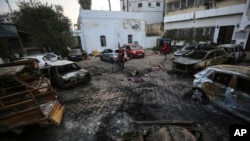The attribution of the October 17 explosion at the Ahli Arab Hospital in Gaza has become one of the most exploited misinformation topics of the Hamas-Israel war thus far. The two sides deny responsibility and blame each other. Governments, NGOs, the press and researchers back one or the other. Mass protests, diplomatic standoffs and fears of a further escalation abound.
In the case of the Ahli Arab Hospital, falsehoods, speculation and unsubstantiated allegations are helping Hamas, the Palestinian group that governs the Gaza Strip in the information war against Israel.
Immediately after the explosion, Hamas claimed that an Israeli airstrike was responsible for the attack, and that it was “a crime of genocide” that killed at least 500 civilians.
Media outlets including the New York Times initially published headlines supporting Hamas’ version of events.
Two days later, Palestinian authorities have yet to provide evidence to back their claims that it was an airstrike or that Israel conducted it.
Israel took a few hours to respond to accusations and half a day before releasing what it says is evidence that a failed rocket launch by Islamic Jihad, a Palestinian Islamist paramilitary organization based in Gaza, caused the blast.
U.S. President Joe Biden has backed that assessment, citing U.S. intelligence data.
Reporting on the incident, Russian state broadcaster RT presented false information to slant the narrative in Hamas’ favor.
In its summary of the accusations and recriminations, RT reported:
“Palestinian officials accused Israel of targeting the facility, while Israel blamed the blast on a wayward rocket fired by the Islamic Jihad militant group, despite a government spokesman seemingly taking responsibility immediately after the strike.”
That is false. None of the Israeli government spokespersons took responsibility for the attack on the hospital, and evidence is piling up that it was not a “strike” but the explosion of a malfunctioned rocket.
The person RT referred to as the Israeli government “spokesman” is Hananya Naftali, who said in a post on X that Israel conducted an airstrike on a hospital used as a base for Hamas militants. The post coincided with the initial reports about the explosion at the Ahli Arab Hospital. Naftali did not provide any details or name the source of information, and later deleted his post. However, pro-Hamas groups and the media have used it as “proof” that Israel is to blame. RT’s report is just one example.
Who is Naftali, and what gives his post enough value to become a key part of the anti-Israeli information campaign?
Naftali is a pro-Israeli social media influencer and YouTuber, who reportedly served as an informal media advisor to Israeli Prime Minister Benjamin Netanyahu. Currently, his name is not listed in the database of Israeli government spokespersons and media advisers, last updated July 23, 2023.
Moreover, Naftali “will not be serving at Netanyahu’s side” during the conflict, according to an interview he gave to the Jerusalem-based news organization All Israel News.
There is no indication Naftali is privy to the Israeli government information regarding Israeli Air Force combat operations in Gaza.
Naftali later apologized for the post, writing:
“Earlier today I shared a report that was published on @reuters about the bombing at the hospital in Gaza which falsely stated Israel struck the hospital. I mistakenly shared this information in a since deleted post in which I referenced Hamas’ routine use of hospitals to store weapons caches and conduct terrorist activity. I apologize for this error.
“As the IDF [Israeli Defense Forces] does not bomb hospitals, I assumed Israel was targeting one of the Hamas bases in Gaza.
"It is known that Hamas is using civilians as human shields, it is a war crime and a crime against humanity. This should be the focus.”
Evidence is emerging supporting Israel’s claim that an errant Islamic Jihad rocket caused the carnage.
It was initially reported that the hospital was rocked by the explosion, when in fact the blast hit a parking lot in the hospital’s courtyard.
That includes the lack of a large impact crater, which Israel says an airstrike would have made.
Independent open-source researchers also say photographic evidence of the Ahli hospital explosion site is not consistent with an airstrike.
They note that the roofs of nearby buildings, awnings, roofing tiles and solar panel installations remained largely intact after the blast.
Evidence of missile fragments that would accompany an IDF airstrike has also not been presented.
Researchers and unnamed U.S. officials say that, based on the available photographic evidence, most of the damage was caused by the ensuing fire, and not the initial blast, which occurred at ground level.
According to the IDF, Islamic Jihad fired a barrage of 10 rockets from a nearby cemetery at 6:50 p.m. Initial reports of a blast at the Ahli hospital were reported at 6:59 p.m. Israel has also released audio they claim is of Hamas militants attributing the blast to a rocket launched by Islamic Jihad.
Israel also says radar data supports its claim that rockets were fired southwest of the hospital at the time of the explosion.
That corresponds with the Biden administration’s initial conclusions.
Adrienne Watson, White House National Security Council spokesperson, tweeted:
“While we continue to collect information, our current assessment, based on analysis of overhead imagery, intercepts and open source information, is that Israel is not responsible for the explosion at the hospital in Gaza yesterday.”
Outside experts have not been able to visit the blast site in Gaza, complicating independent verification efforts.





